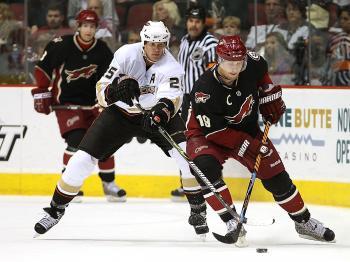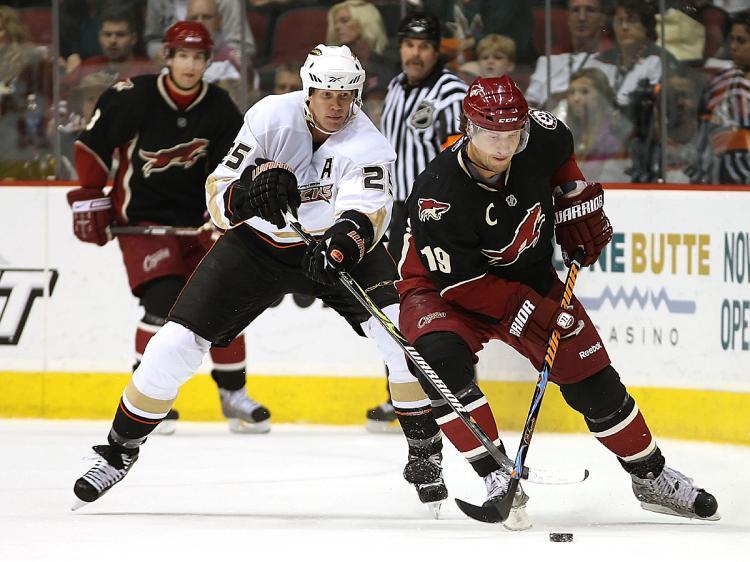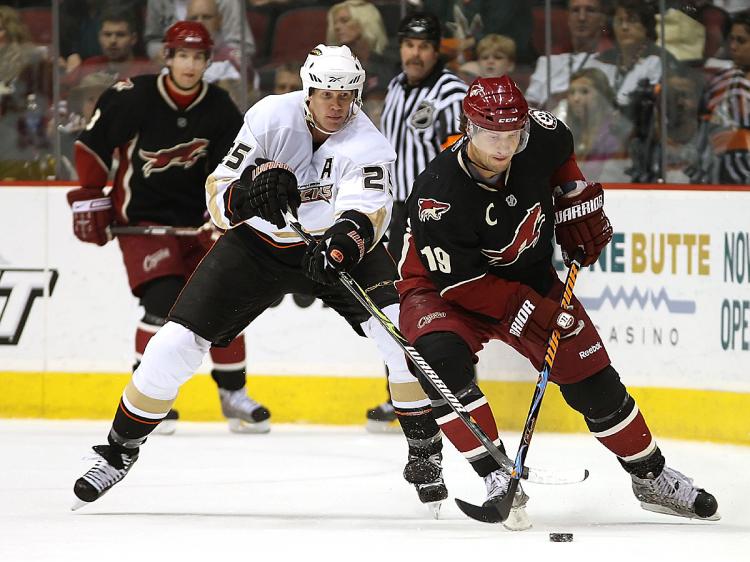Its outcome could affect how much influence sports owners have in purchasing, relocating, and managing sports teams in the future in an industry where gentlemen’s agreements and business relationships often trump financial and legal obligations.
The Phoenix Coyotes is struggling both on and off ice—it is consistently terrible in the Western Conference and is one of a handful of NHL hockey teams in financial trouble.
Its current owner, trucking magnate and founder of Swift Transportation, Jerry Moyes, is also reportedly dealing with financial difficulty. The Coyotes’ holding company filed for bankruptcy protection last week after Moyes reached an agreement in principle to sell the team to billionaire Canadian entrepreneur Jim Balsillie for $212.5 million. Balsillie, the co-CEO of Research In Motion, Ltd.—maker of the immensely popular BlackBerry handhelds—would in turn relocate the hockey team to his hometown of Hamilton, Ontario, Canada.
With a new owner, a NHL-ready arena (Copps Coliseum in Hamilton is ready to host), infusions of cash (Balsillie has reportedly made available $17 million in debtor-in-possession financing), and a Canadian fan base that has been looking for another team to cheer for besides the Toronto Maple Leafs, all seemed well in hockey world.
But not so fast, says the NHL.
NHL Commissioner Gary Bettman says that he was unaware of the deal, and that he would block any move of the Coyotes to Canada. Bettman had helped to negotiate a sale of the Coyotes to Chicago Bulls owner Jerry Reinsdorf, at a lower amount than the Balsillie deal. The major difference is that Reinsdorf reportedly agreed to keep the team in Arizona.
In a hearing last week at the U.S. Bankruptcy Court of Phoenix, the NHL claimed that the league was in control of the team after it had lent the Coyotes $30 million in cash last November and due to a number of other agreements signed by Moyes. The NHL’s control of the team was contested by Moyes.
“It’s our position—the League’s position—that due to several proxies executed by Jerry Moyes on behalf of the Coyotes in favor of the National Hockey League, that, in fact, we control the Coyotes, have controlled the Coyotes and that he had no authority to put the team in bankruptcy,” NHL Deputy Commissioner Bill Daly said on XM Radio’s “NHL Home Ice” program.
Filing for bankruptcy allows the team to terminate all of its current agreements and contracts—including its 30-year lease of Jobs.com Arena in Glendale, Arizona. The main reason for Moyes’ bankruptcy filing was to void the arena lease, which prevented the team from relocating to Canada.
“The two most important issues for any sports league are, who owns its franchises and where its clubs are located,“ Bettman said in his weekly NHL radio address. ”The NHL, like the other sports leagues, has clear rules, policies and procedures to deal with those two issues. The issue in Phoenix deals simply with who owns and controls the franchise and where the franchise will be located.”
Legality aside, there are other objections that the NHL harbors in relocating the team to Ontario.
For years, the NHL has peddled ice hockey in regions that may not seem like a good fit on the surface (see Panthers, Florida). One reason is competition—the other three of the four major sports leagues, the National Football League (NFL), the NBA, and Major League Baseball (MLB) all have teams distributed throughout the southern United States.
Not that hockey can’t be successful in the desert, but despite having the Michael Jordan of hockey in Wayne Gretzky as head coach, the Coyotes have enjoyed minimal success on the ice and at the box office.
The league also doesn’t want an outsider—no matter how much he loves the game—to negotiate on his terms how to buy into the inner circle of ice hockey, or to dictate where to place teams.
But in court, sports sense may not sway U.S. bankruptcy laws. In bankruptcy the bankrupt entity goes to the buyer that offered the most money to repay its creditors. If the judge determines that Moyes has control of the team and the Coyotes’ bankruptcy is legal, then Balsillie’s agreement may win out.
If Balsillie and Moyes prevail, it’s a no brainer that the Coyotes’ relocation would work. In Southern Ontario, the team should never run into financial troubles again.
If the NHL wins out, the NFL, NBA, and MLB may breathe a collective sigh of relief. Also, Balsillie may well give up his dream of owning an NHL franchise. He attempted to purchase the Pittsburgh Penguins and the Nashville Predators in the past, and this latest move isn’t likely to grant him goodwill with the league in the future.






